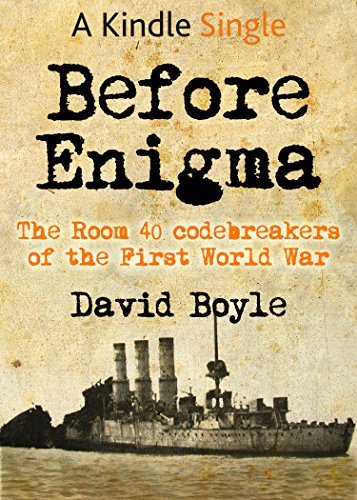
How did the British codebreakers succeed in cracking the apparently unbreakable Enigma code during the Second World War? Was it their gifted amateurism? The brilliance of Alan Turing? The invention of the very first computers? Or the pioneering work of Polish cryptographers? It was all of the above. But there is one other crucial factor, which is much less well known. The same team had done it before. The truth is that many of those most closely involved in cracking the Enigma code – Alistair Denniston, Frank Birch, Dilly Knox – had wrestled with German naval codes for most of the First World War. By the end of the war they had been successfully cracking a new code every day, from their secret Room 40 at the Old Admiralty Building, in a London blacked out for Zeppelin Raids. The techniques they developed then, the ideas that they came to rely on, the people they came to trust, had been developed the hard way, under intense pressure and absolute secrecy during World War I. Before Enigma tells their story and explains how they managed to crack the supposedly indecipherable code. The book outlines the capture of the Magdeburg and the Hobart, discusses the use of cracked codes to bring German fleets to battle at Dogger Bank and Jutland, and focuses on individuals such as Winston Churchill and Admiral Sir Reginald ‘Blinker’ Hall and their importance in the development of a British naval code tradition. Praise for David Boyle ‘Exhilarating’ - Daily Mail David Boyle is a British author and journalist who writes mainly about history and new ideas in economics, money, business and culture. He lives in Crystal Palace, London. His books include Alan Turing: Unlocking the Enigma, Operation Primrose, Rupert Brooke: England’s Last Patriot, Peace on Earth: The Christmas Truce of 1914, Jerusalem: England’s National Anthem and Unheard Unseen: Warfare in the Dardanelles . Endeavour Press is the UK's leading independent digital publisher. For more information on our titles please sign up to our newsletter at www.endeavourpress.com. Each week you will receive updates on free and discounted ebooks. Follow us on Twitter: @EndeavourPress and on Facebook via http://on.fb.me/1HweQV7. We are always interested in hearing from our readers. Endeavour Press believes that the future is now.
Author
David Boyle is the author of Blondel’s Song: The Capture, Imprisonment and Ransom of Richard the Lionheart, and a series of books about history, social change and the future. His book Authenticity: Brands, Fakes, Spin and the Lust for Real Life helped put the search for authenticity on the agenda as a social phenomenon. The Tyranny of Numbers and The Sum of Our Discontent predicted the backlash against the government’s target culture. Funny Money launched the time banks movement in the UK. David is an associate of the new economics foundation, the pioneering think-tank in London, and has been at the heart of the effort to introduce time banks to Britain as a critical element of public service reform - since when the movement has grown to more than 100 projects in the UK. He is also the founder of the London Time Bank network and co-founder of Time Banks UK. He writes about the future of volunteering, cities and business. His work on the future of money has also been covered in books and pamphlets like Why London Needs its own Currency (nef, 2000), Virtual Currencies (Financial Times, 2000), The Money Changers: Currency reform from Aristotle to e-cash (Earthscan, 2002) and The Little Money Book (Alastair Sawday, 2003). He has written for many national newspapers and magazines, and edited a range of magazines including Town & Country Planning and Liberal Democrat News. He is the editor of Radical Economics. He lives in Crystal Palace, in south London, with Sarah and Robin (two years old). He is a member of the Federal Policy Committee of the Liberal Democrats and he stood for Parliament in Regents Park and Kensington North in 2001.